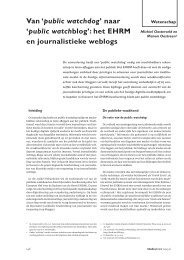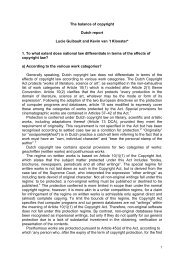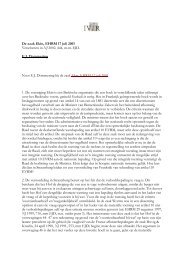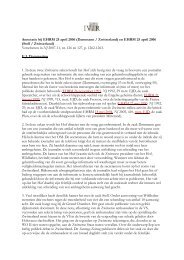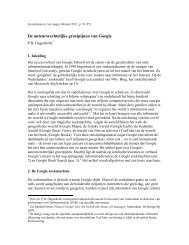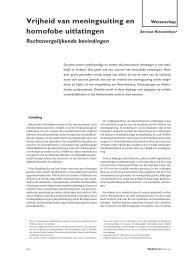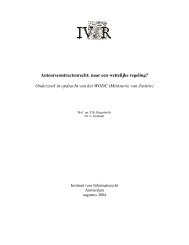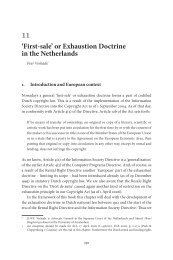unravelling the myth around open source licences - IViR
unravelling the myth around open source licences - IViR
unravelling the myth around open source licences - IViR
You also want an ePaper? Increase the reach of your titles
YUMPU automatically turns print PDFs into web optimized ePapers that Google loves.
4. The freedom to improve <strong>the</strong> program, and release your improvements to <strong>the</strong> public,<br />
so that <strong>the</strong> whole community benefits. Access to <strong>the</strong> <strong>source</strong> code is a precondition for<br />
this.<br />
The freedom to study <strong>the</strong> functioning of <strong>the</strong> computer program, to adapt it to your needs or<br />
improve <strong>the</strong> program and to release improvements to <strong>the</strong> public cannot exist without a free,<br />
unlimited access to <strong>the</strong> <strong>source</strong> code. Consequently, instead of ‘free software’ <strong>the</strong> expression ‘<strong>open</strong><br />
<strong>source</strong> software’ may be used. Never<strong>the</strong>less, factual access to <strong>the</strong> <strong>source</strong> code does not imply that it<br />
is legally permitted to change or distribute software. Microsoft, for example, grants governments and<br />
businesses access to its software <strong>source</strong> code with its ‘shared <strong>source</strong>’ initiative. But <strong>the</strong>se parties are<br />
not always permitted to modify and redistribute <strong>the</strong> software in question. 56<br />
The freedoms mentioned above are included in <strong>the</strong> <strong>open</strong> <strong>source</strong> licenses considered <strong>the</strong> most<br />
important, and <strong>the</strong>y are also part of <strong>the</strong> OSD. Article 0 of <strong>the</strong> GPL guarantees <strong>the</strong> right to use <strong>the</strong><br />
computer program for any purpose. Based on articles 1 and 3 of <strong>the</strong> GPL, <strong>the</strong> licensee has <strong>the</strong><br />
freedom to copy and distribute <strong>the</strong> program. Article 2 of <strong>the</strong> GPL enables <strong>the</strong> licensee to copy and<br />
distribute <strong>the</strong> program in an adapted form. To safeguard <strong>the</strong>se principles <strong>the</strong> GPL requires software<br />
producers to give users free access to <strong>the</strong> <strong>source</strong> code, a requirement discussed in <strong>the</strong> next paragraph.<br />
Article 1 of <strong>the</strong> OSD states that a license may not restrict redistribution. According to article 3,<br />
<strong>the</strong> redistribution of modified software and derived works must be permitted. Articles 6 and 8 of <strong>the</strong><br />
OSD stipulate that <strong>licences</strong> cannot restrict <strong>the</strong> way <strong>the</strong> software will be used with respect to certain<br />
fields of endeavour and must not depend on <strong>the</strong> program's being part of a particular software<br />
distribution. In articles 2.1 and 2.2 of <strong>the</strong> MPL, licensees are given <strong>the</strong> freedom to use, reproduce,<br />
modify, display, perform, sublicense and distribute <strong>the</strong> Original Code (or portions <strong>the</strong>reof) with or<br />
without modifications as long as any modification which a licensee created or to which a licensee<br />
contributed is made available in <strong>source</strong> code form (article 3.2).<br />
The BSD-licence does not contain such a requirement. It only grants <strong>the</strong> permission to use and<br />
distribute <strong>the</strong> software in an adapted or unadapted form.<br />
2.2.3 The importance of <strong>open</strong>ness<br />
As has been noted before, without real access to <strong>the</strong> <strong>source</strong> code <strong>the</strong> freedoms described<br />
earlier cannot be exercised effectively. With access to <strong>the</strong> <strong>source</strong> code it is much easier to study and<br />
to modify computer software. As a result, some <strong>open</strong> <strong>source</strong> <strong>licences</strong> require that <strong>the</strong> distribution of<br />
software in binary form should be accompanied by <strong>the</strong> <strong>source</strong> code. This leads to a number of<br />
questions.<br />
First, what is <strong>the</strong> meaning of <strong>the</strong> term ‘<strong>source</strong> code’? As has been pointed out in paragraph<br />
2.1.1, <strong>licences</strong> use a functional definition of <strong>source</strong> code. Article 3 of <strong>the</strong> GPL defines <strong>source</strong> code as<br />
‘<strong>the</strong> preferred form of <strong>the</strong> work for making modifications to it’. Article 1.1 of <strong>the</strong> MPL gives <strong>the</strong><br />
same definition of <strong>the</strong> term. The explanatory note belonging to article 2 of <strong>the</strong> OSD uses a similar<br />
definition: ‘We require access to unobfuscated <strong>source</strong> code because you can’t evolve programs<br />
without modifying <strong>the</strong>m. Since our purpose is to make evolution easy, we require that modification<br />
be made easy’.<br />
Secondly, how must <strong>the</strong> <strong>source</strong> code be made accessible? This question also concerns a<br />
functional requirement meant to facilitate <strong>the</strong> way software is studied and modified. Article 3 of <strong>the</strong><br />
GPL states that <strong>the</strong> binary code of a computer program may be distributed, when:<br />
56 Microsoft Shared Source Initiative Overview, November 2002, at<br />
http://www.microsoftcom/re<strong>source</strong>s/shared<strong>source</strong>/Initiative/Initiative.mspx.<br />
15



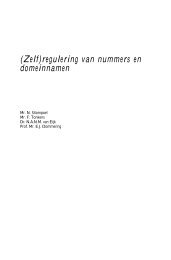
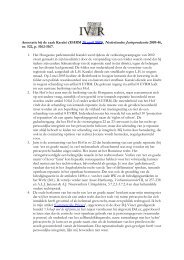
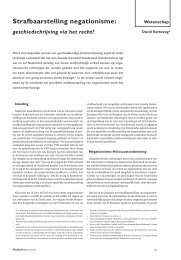
![Legal Opinion of Professor Egbert Dommering [1] concerning ... - IViR](https://img.yumpu.com/23603085/1/184x260/legal-opinion-of-professor-egbert-dommering-1-concerning-ivir.jpg?quality=85)
